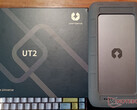Short review of the ADATA SE920: How does the ultra-fast external SSD with active cooling and USB 4 perform in practice?
The ADATA SE920 is a portable SSD that aims to set new standards with its speed. All USB-C standards are supported, including Thunderbolt 4—but according to its technical data, a USB 4 connection should be able to provide the best performance. Achieving over 3,000 MB/s when it comes to sequential reading and writing, the ADATA SE920 is currently one of the fastest external SSDs on the market.
Specifications
| Capacity | 1 TB/2 TB/4 TB/8 TB |
| Connectivity | USB 4 (40 Gbps), Thunderbolt 4 |
| Data transfer rates (sequential, manufacturer specification) | Read: up to 3,800 MB/s Write: up to 3,700 MB/s (USB4) Write: up to 3,200 MB/s (Thunderbolt 4) |
| Security | - |
| Size | With active cooling: 122.56 x 64.2 x 15.9 mm, with deactivated cooling: 105 x 64.2 x 15.9 mm |
| Weight | 181.52 g |
| Warranty | 5 years |
| Firmware | A231W74A |
| Scope of delivery | ADATA SE920, USB cable (Type-C to Type-C, 0.3 m) |
Case and connectivity - A metal case and active cooling
The ADATA SE920 is a compact and high-quality SSD. Its case is mainly made of metal and can be pushed together using a sliding mechanism. In its more compact format, the built-in fan is then deactivated. When you press it together slightly, a spring mechanism is activated, which extends the case by around 15 millimeters.
At the same time, the active cooling unit is activated in order to better dissipate the heat generated from the case. The interface is a USB Type-C port, which can at best work at USB4 speed. Thankfully, backward compatibility is ensured in every respect. Thunderbolt 4 is also directly supported. According to the manufacturer, this results in theoretical data transfer rates of up to 40 GBit/s.
The physical size of the SSD is slightly larger than a credit card and its thickness is only 15.9 millimeters. In short, the ADATA SE920 doesn't look bulky and fits comfortably in your hand, which is also underpinned by its weight of approx. 181 grams. The manufacturer hasn't experimented with colors and all storage devices are only available with a black case.
Performance - The ADATA SE920 is slightly slower than indicated
As you can see from the ADATA SE920's technical data, the external SSD operates at USB 4 (40 Gbps) speeds at best. In order to get the full performance out of the SSD, it is essential to activate its write cache in the settings (see images).
Its everyday performance is massively dependent on the interface used and its transfer rate, as not every USB-C port communicates at a speed of 40 Gbps. In the worst case, we measured slightly less than 1,000 MB/s for sequential reading and writing. Here, we used the ADATA SE920 with a USB 3.1 (Gen 1) port, which only offers a maximum speed of 10 Gbps. Using the significantly faster USB 4 connection, you get noticeably better performance from the SSD, although we couldn't quite reach the manufacturer's specified data rates. Even if the manufacturer's specifications are not achieved, its transfer rates are very high. The Thunderbolt 4 interface was slightly slower in our test, but this should hardly be noticeable during everyday use.
Temperature and stress test
The case temperatures are distributed quite evenly thanks to its metal surfaces. Meanwhile, the built-in fan ensures a more stable performance under load. Nevertheless, the case temperatures still rise significantly, easily reaching 50 °C. During the stress test, in which we wrote the SSD almost completely full once, we noted that its performance couldn't be maintained permanently and was throttled after just over a minute. This phenomenon could be seen in operation with active cooling and passive cooling. We still noted a difference in performance, as its write rate could be kept at a noticeably higher level with active cooling. Those who intend to use the SSD in continuous load scenarios should therefore make sure to use the active cooling unit.
Pros
+ high write and read rates
+ wide compatibility
+ compact and stable case
+ active cooling unit
+ 5-year warranty
Cons
– slightly slower than expected
– high case temperatures under load
Verdict - Powerful SSD with subtle weaknesses
The ADATA SE920 is a high-quality portable SSD that impresses with its enormous speeds and modern technology. Thanks to its USB 4 standard, it achieves transfer rates of up to 40 Gbit/s, which make themselves known during everyday use in the shape of fast data transfers and smooth operation when working with large files. This is particularly beneficial for users who regularly work with large amounts of data, such as 4K and 8K videos or 3D models. In our test, the SE920 proved to perform extremely well during both reading and writing tasks, although there may be some performance losses due to its temperature. With the active cooling unit switched on, however, the performance drops become noticeably lower.
The ADATA SE920 impresses with its high performance and wide range of potential use scenarios.
The SSD's design is slim, modern and robust, making the ADATA SE920 an ideal companion for on the go. One small disadvantage of the ADATA SE920 could be its compatibility. In order to make use of its full speed, the ADATA SE920 must be operated on a USB4 or Thunderbolt port. Its transfer rates are correspondingly slower when using older USB ports, which are still very common.
All-in-all, the ADATA SE920 offers an excellent combination of speed, portability and reliability. It is primarily aimed at professional users and power users who rely on fast data transfers and high storage capacities. Despite the slight limitations when it comes to compatibility and continuous load, the ADATA SE920 is one of the best mobile data carriers currently available on the market.
Price and availability
The ADATA SE920 can be purchased from major online retailers such as Amazon, where the 1-TB model currently costs US$179.99.
Transparency
The selection of devices to be reviewed is made by our editorial team. The test sample was given to the author by the manufacturer free of charge for the purposes of review. There was no third-party influence on this review, nor did the manufacturer receive a copy of this review before publication. There was no obligation to publish this review. We never accept compensation or payment in return for our reviews. As an independent media company, Notebookcheck is not subjected to the authority of manufacturers, retailers or publishers.
This is how Notebookcheck is testing
Every year, Notebookcheck independently reviews hundreds of laptops and smartphones using standardized procedures to ensure that all results are comparable. We have continuously developed our test methods for around 20 years and set industry standards in the process. In our test labs, high-quality measuring equipment is utilized by experienced technicians and editors. These tests involve a multi-stage validation process. Our complex rating system is based on hundreds of well-founded measurements and benchmarks, which maintains objectivity. Further information on our test methods can be found here.




































